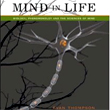Monday, 20 January 2014
The Continuum Between Life and Mind
 Neurophysiologist Walter J. Freeman once made the provocative statement that there is: “no deeper prison of the modern mind than the Cartesian legacy that splits mind from life.” He then added that Evan Thompson, in his book Mind in Life: Biology, Phenomenology, and the Sciences of Mind, published in 2007, had recognized this impasse and helped to overcome it. In the October 2012 Brain Science Podcast, Dr. Ginger Campbell interviews Thompson about this book, which synthesizes knowledge from multiple disciplines.
Neurophysiologist Walter J. Freeman once made the provocative statement that there is: “no deeper prison of the modern mind than the Cartesian legacy that splits mind from life.” He then added that Evan Thompson, in his book Mind in Life: Biology, Phenomenology, and the Sciences of Mind, published in 2007, had recognized this impasse and helped to overcome it. In the October 2012 Brain Science Podcast, Dr. Ginger Campbell interviews Thompson about this book, which synthesizes knowledge from multiple disciplines.
In Mind in Life, Thompson successfully shows the profound continuity between life and mind, between the first living systems (such as bacteria) and cognition, the process by which we assign meaning to the attributes of our environment. In other words, he shows that cognition is embodied. This was the subject of The Embodied Mind: Cognitive Science and Human Experience, the landmark work that Thompson co-authored with Francisco Varela and Eleanor Rosch in 1991 and to which Mind in Life constitutes a sort of sequel.
Mind in Life presents Varela and Thompson’s arguments for the rehabilitation of a phenomenological approach to neuroscience, so that the two disciplines can usefully constrain each other. Thus the nuances of lived experience (phenomenology) can inform neurobiological models, while in return these models can inform phenomenological introspection. But most important, this book traces the path from the simple basic “self-organization” of living cells to the most complex human phenomena, such as consciousness, intersubjectivity, and culture.
Dr. Campbell, who has been hosting the Brain Science Podcasts for a number of years, explains at the start of this podcast that she is personally fascinated with this embodied approach to cognition and the emergent phenomena associated with it. In this sense, she notes that her interview with Evan Thompson can be regarded as part of an ongoing exploration and as a follow-up to her recent interview with Terrence Deacon about his book Incomplete Nature: How Mind Emerged from Matter. In her interview with Deacon, Dr. Campbell focuses on this book’s central idea, which is that meaning and life are compatible with a scientific view of the world.
![]() “Mind in Life” with Evan Thompson (Brain Science Podcast 89)
“Mind in Life” with Evan Thompson (Brain Science Podcast 89)
![]() Terrence Deacon (podcast interview)
Terrence Deacon (podcast interview)
![]() Mind in life and life in mind
Mind in life and life in mind
![]() Mind in Life: Biology, Phenomenology, and the Sciences of Mind
Mind in Life: Biology, Phenomenology, and the Sciences of Mind
Uncategorized | Comments Closed







